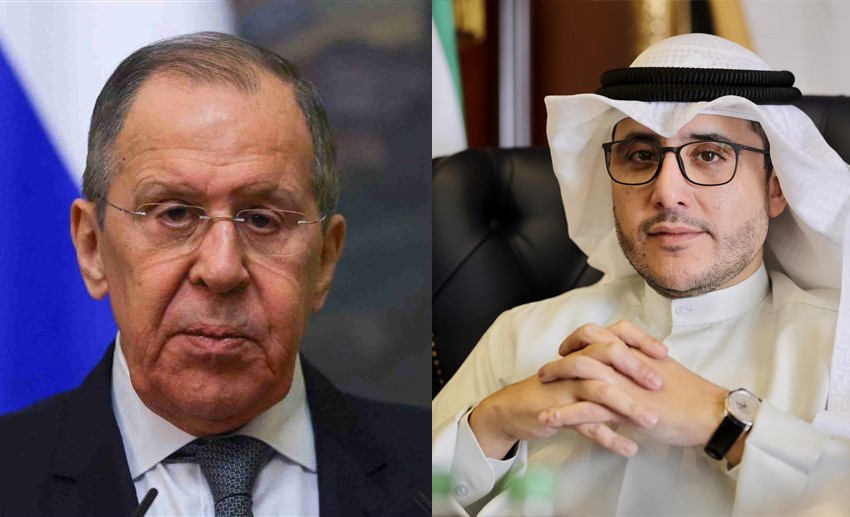28/03/2022
28/03/2022
KUWAIT CITY, March 28, (Agencies): Foreign Minister Sheikh Dr. Ahmad Nasser Al-Mohammad Al-Sabah and Russian counterpart Sergey Lavrov discussed on Monday via phone the developments connected with the Ukraine crisis. During the phone conversation, Minister Dr. Ahmad Al-Mohammad affirmed the State of Kuwait’s commitment to principles of international law and the UN Charter. He reiterated his country’s support of international efforts for a ceasefire and de-escalating tension in the Ukraine to find a peaceful solution through dialogue.

The Group of Seven major economies have agreed to reject Moscow’s demand to pay for Russian natural gas exports in rubles, the German energy minister said Monday. Robert Habeck told reporters that “all G-7 ministers agreed completely that this (would be) a one-sided and clear breach of the existing contracts” for natural gas, which is used to heat homes, generate electricity and power industry. He said officials from France, Germany, Italy, Japan, the United States, the United Kingdom and Canada met Friday to coordinate their stances and that European Union representatives also were present.
Habeck said that “payment in ruble is not acceptable and we will urge the companies affected not to follow (Russian President Vladimir) Putin’s demand.” Putin announced last week that Russia will demand “unfriendly” countries pay for natural gas only in Russian currency from now on, instructing the central bank to work out a procedure for buyers to acquire rubles in Russia. The demand sent already high gas prices even higher amid fears it could be a prelude to a natural gas shutoff, which could disrupt Europe’s economy and hurt Russia’s finances. Economists said the move appeared designed to try to support the ruble, which has collapsed against other currencies since Putin invaded Ukraine on Feb. 24 and Western countries responded with far-reaching sanctions against Moscow. But some analysts expressed doubt that it would work. Asked by reporters earlier Monday if Russia could cut natural gas supplies to European customers if they reject the demand to pay in rubles, Kremlin spokesman Dmitry Peskov said in a conference call that “we clearly aren’t going to supply gas for free.”
“In our situation, it’s hardly possible and feasible to engage in charity for Europe,” Peskov said. Asked what happens if Russia turns off the taps now, Germany’s energy minister said, “We are prepared for all scenarios.” “Putin’s demand to convert the contracts to ruble (means) he is standing with his back to the wall in that regard, otherwise he wouldn’t have made that demand,” Habeck said, adding that Russia needs rubles to finance its war at home, such as payments to troops. The European Union meanwhile announced that the 27-member bloc wants to get rid of Russian energy supply by the year 2027 due to Russia’s invasion of Ukraine. “We aim to be completely independent of Russian fossil fuels by 2027 and we believe it is possible to reduce our demands within a year,” Tim Mcphie, EU Spokesperson for Energy, told a news conference in Brussels today.
“This is the objective that we have set which has been endorsed by EU leaders during their meeting in Brussels last week,” he noted. The European Commission intends to present its Repower EU plan by end of May which aims to make EUrope independent from Russian fossil fuels, starting with gas, in light of Russia’s invasion of Ukraine. The EU imports around 40 percent of its gas needs from Russia. US President Joe Biden during a visit to Brussels last week committed to provide the European Union with, 15 billion cubic meters of LNG this year. The US and Europe will ensure stable demand and supply for additional, at least, 50 billion cubic meters of US LNG until 2030, he announced.
Peace without delay
Ukraine is prepared to declare its neutrality and consider a compromise on contested areas in the country’s east, President Volodymyr Zelenskyy said ahead of another round of talks set for Tuesday on stopping the fighting. But he said only a face-to-face meeting with Russia’s leader can end the war. While hinting at possible concessions, Zelenskyy also stressed that Ukraine’s priority is ensuring its sovereignty and its “territorial integrity” - preventing Russia from carving up the country, something Ukraine and the West say could now be Moscow’s goal. Russia has long demanded that Ukraine drop any hope of joining the Western NATO alliance, which Moscow sees as a threat. Zelenskyy has also repeatedly stressed that Ukraine needs security guarantees of its own as part of any deal. “Security guarantees and neutrality, non-nuclear status of our state - we are ready to go for it,” Zelenskyy said in an interview Sunday with independent Russian media outlets.
Russia shifts focus
With its aspirations for a quick victory dashed by a stiff Ukrainian resistance, Russia has increasingly focused on grinding down Ukraine’s military in the east in the hope of forcing Kyiv into surrendering part of the country’s territory to possibly end the war. The bulk of the Ukrainian army is concentrated in eastern Ukraine, where it has been locked up in fighting with Moscow-backed separatists in a nearly eight-year conflict. If Russia succeeds in encircling and destroying the Ukrainian forces in the country’s industrial heartland called Donbas, it could try to dictate its terms to Kyiv and, possibly, attempt to split the country in two.


